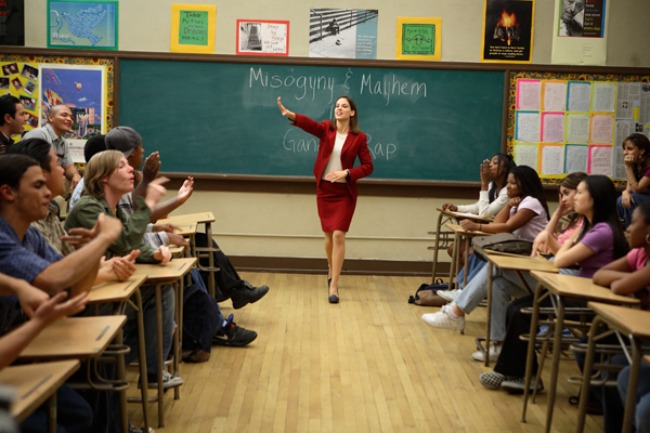#Professors #Teaching on #Students Philosophies

#Professors #Teaching on #Students Philosophies
—
Jennifer Kent-Walsh, Communicative Disorders
Goals & Foundational Principles
Beyond striving to ensure that students learn the fundamental content of the courses I teach, my objectives as a university teacher are as follows: (a) to foster critical thinking skills; (b) to facilitate the acquisition of lifelong learning skills; (c) to help students develop evidence-based clinical problem-solving strategies; and (d) to prepare students to function as highly skilled and competent speech-language clinicians across the scope of practice and in my primary teaching area of augmentative and alternative communication (AAC) in particular. Furthermore, my overall teaching philosophy is based on two principles, which are supported extensively in the literature: (a) active student learning strongly influences student-learning outcomes; and (b) assessment procedures strongly influence student acquisition of knowledge.
Teaching & Assessment Methods
Given that undergraduate courses in speech-language pathology are necessarily weighted toward acquisition of foundational clinical concepts and knowledge, I use a combination of traditional lecture and problem-based learning formats in my teaching. All of my courses involve at least some WebCT components, giving students opportunities to download lecture note-taking guides and materials and further their knowledge of course content through engagement in complementary online activities (e.g., simulation activities, video case studies).
Service-learning is a pedagogical approach that I use consistently with undergraduate students. This experiential learning tool allows students to apply their knowledge to real-world problems in community contexts and to complete structured reflections on the relationships between assignments, course objectives, and personal educational objectives. I feel it is important to include such activities in all of my classes since writing skills are critical for all speech-language clinicians and researchers. I also use undergraduate research as a teaching tool, since the research process allows students to apply classroom knowledge through scientific questions of specific interest.
Overall Value of My Teaching Role in the University Setting
One of the main reasons why I decided to pursue a career in academia was so that I would have the opportunity to work with future generations of speech-language pathologists and educators in an instructional capacity. I view teaching as central to all of my scholarly activities and regularly include Scholarship of Teaching and Learning (SOTL) in my strategic plan. These activities allow me to identify and disseminate instructional strategies to ensure that students learn about the cutting edge clinical interventions I research on a daily basis. It is my hope that my teaching will allow me to “keep the flame of scholarship alive” in some way and to inspire students to remain focused on the functional effects of interventions designed to improve clients’ speech, language, and communication skills.
Judith Ruland, Nursing
My philosophy of teaching is based on a belief that learning needs to be student centered and that students need to be equal partners in the learning process. My role involves using my expertise to put the necessary resources in the hands of the students or more likely to be sure that my students are well equipped to find and evaluate the resources they need to answer their questions.
Now that the majority of my teaching is in an online forum, I let students know that my role in the online classroom is to be a facilitator, not a provider of information. I create multiple discussion questions to keep the online discussion exciting and stimulating and to address the multiple backgrounds and interests of my adult learners. I provide a good deal of rigor in my undergraduate classes, but am right there to support them as they seek their answers and to encourage them to work together to get the most out of their learning. I always provide detailed descriptions of writing assignments and I provide samples so that they are able to see what a good finished product should look like. My students often wonder at first “where I am” in that I am not actively “running” a discussion. Instead I am carefully reading, correcting errors when I see them, and then working to analyze what the group has said from a meta perspective. I share my analysis with the class as we end each module.
To me the most important skills that I can help an undergraduate student develop are the skills of information fluency: i.e. their ability to write and critically think about the information that is bombarding them as they enter or continue in the nursing profession. Every course I teach is really seen through the lens of information processing skills needed to be effective in use of the best available evidence for practice. I am passionate about the use of writing to teach students to be more aware of their thinking and to be careful and reasoned in their acceptance of new information. If they leave me with a healthy skepticism of information and the skill to use technology to access better evidence, I will have accomplished my goal.
Stephen Kuebler, Chemistry
My teaching philosophy is that pedagogic activities should be guided by the principal: “Do this if it enables students to learn.” My teaching practices should empower students to take ownership of their education and help them realize that they are responsible for their learning outcomes. When students take this step, they can make striking progress and achieve academic success. I find that when I can convey my own enthusiasm for physical science, it is often contagious enough that students become engaged in learning. I try to help students transition from memorizing formulas to thinking critically about ideas and connecting concepts with everyday examples. I encourage students to tackle problems creatively, which helps them learn to think outside conventional boundaries and to seek the deeper meaning of a concept or finding. These skills have facilitated the greatest advances in science and also foster personal and intellectual fulfillment.
I believe teaching is the most important service I provide to the Central Florida Community, because I am helping to educate a generation to function knowledgeably in a society where rapid technological advances constantly pose new questions and ethical challenges. I view teaching as inextricably linked with research scholarship. University education must go beyond simply passing on information. It should involve rigorous training in the methods of developing, analyzing, and communicating new knowledge. Teaching should extend well beyond the lecture hall. For many students, the most powerful lessons are learned in informal discussions, working problems during office hours, and encountering science first-hand in the lab.
I chose an academic career because I want to develop new knowledge through research, as well as contribute to my field and society by training top-rate students. There appears to be no single perfect method for teaching, and an important aspect of teaching seems to be identifying the approach, which works best for a given individual. While I believe my teaching has been successful, I also recognize that I have much to learn from my colleagues and students. I look forward to continuing teaching, research, and research training and learning from my students and peers along the way.
Tosha Dupras, Anthropology
The goal of my teaching, and center of my teaching philosophy, is active learning. One of my ultimate objectives in teaching is to facilitate learning by helping students to gain the necessary skills to take control of and become active participants in their own learning. I truly believe that knowledge gained through active participation is knowledge that will stay with an individual. Thus my approach to teaching reflects this philosophy and I have developed and use many techniques that are designed to engage students in their own learning.
I use many different teaching techniques to achieve my philosophy. Biological anthropology is a discipline in which many teaching techniques can be used, particularly hands-on activities. Throughout my tenure at UCF I have worked very hard to build our teaching collections so that all my courses may include an element of hands-on learning. Students have to directly participate in their own learning through these experiences, and I have found that almost all students respond very well to tactile learning (actually “holding” the material in their hands). One particularly innovated teaching method I have developed is a simulated crime scene in the Advanced Forensic Anthropology course in which the students have to apply their cumulated course knowledge. I also believe that students learn from participating in real world activities.
Regardless of content, I also think that students should leave their courses with skills that they will use in their everyday lives. These basic skills include problem solving and critical thinking, research and writing proficiency, and effective communication ability. I have designed all of my courses to include components that impart these skills. All of my upper division courses require research for papers and presentation, and students must also participate in group work. These are skills that students can transfer into any career choice.
Jill Davis, Social Work
I believe that to be most effective as an instructor, one must create a safe environment that is interactive and collaborative and that promotes problem-solving and critical thinking skills. A welcoming environment accommodates a variety of adult learning styles and encourages students to present their opinions while respecting the opinions of others. By giving students a voice in class, not only do the students benefit from peer-peer learning by enriching the course material with personal experiences and knowledge, but they also take responsibility for their own learning and, therefore, enhance the integration of their new knowledge into practice. Promoting independent thinking is essential so that students can take what they have learned and apply it in real-life situations. Therefore, I endeavor to make my classroom an arena for students to learn skills and demonstrate outcomes.
To create a safe learning environment, I encourage students to ask questions and give their views on the material we are covering. I solicit anonymous feedback in the form of “one-minute papers” from my students about assignments as well as my teaching style, and I then implement student suggestions to improve my service delivery and their learning outcomes. I create assignments that improve students’ problem-solving and critical thinking skills, such as analyzing the behaviors of a social worker as depicted in a television show to determine if the social worker abided by the NASW Code of Ethics. I utilize small-group discussions both to actively involve the students in their own learning as well as to improve their critical thinking skills.
In order to achieve the ultimate goal of student learning, I strive to implement strategies that create a collaborative and safe atmosphere and encourage the application of knowledge to new situations. I believe that these strategies help students become ready and able to utilize their knowledge in their studies and in their future employment.
Ruby Evans, Educational Research, Technology and Leadership
Overview
The constancy of change in contemporary teaching and learning environments behooves one to think critically about a teaching philosophy. In the 21st century, a new literacy has emerged—the ability to use appropriate technological tools in an Information society. For example, the personal computer and associated technological innovations, e.g., the Internet and E-mail, have become commonplace.
Alvin Toffler, futurist, and author of the classic Future Shock, puts it best, when he says: “The illiterate of the 21st century will not be those who cannot read and write, but those who cannot learn, unlearn, and relearn”. Faculty must critically examine and re-examine teaching philosophies, as the environments in which teaching and learning become increasingly diverse and varied.
Since originally published in 1987 by the American Association of Higher Education (AAHE), Chickering and Gamson’s “Seven Principles for Good Practice in Undergraduate Education” have weathered the test of time. These principles, equally applicable to graduate instruction, provide an adequate conceptual framework for the goals of my teaching philosophy. Chickering and Gamson assert that good educational practice does the following:
- Encourages student-faculty contact
- Encourages cooperation among students
- Encourages active learning
- Gives prompt feedback
- Emphasizes time on task
- Communicates high expectations
- Respects diverse talents and ways of learning
Methodology
In teaching, my overarching goal is to develop a student-centered environment. I want students to actively participate, rather than passively learn. When planning a course of instruction, I identify a set of objectives and skills. Next, I compile a rationale for each objective and skill. I design a course plan that emphasizes the application of critical thinking skills to foster deep learning, and the use of collaborative learning skills to facilitate “real-world” problem solving. I also embed activities in the instructional process that are designed to help students develop research and writing skills—readily transferable across disciplines—as they engage in learning of content material.
Throughout the teaching and learning process, I incorporate multiple choices and pathways through the learning materials. I encourage students to engage in open-ended formative and summative evaluation of the course (what’s working, what’s not). I also ask students to self-evaluate individual progress. Finally, my course design includes a data-driven evaluation component, which focuses on systematic outcomes and results, that are clearly tied to course goals and objectives.
Evaluation
To measure student learning, I provide multiple assessments. Over my 16 years of teaching experience, these assessments have included:
- Collaborative research projects
- Formal scholarly research papers
- Portfolios
- Presentations (Speaking, Multimedia)
- Quizzes
- Review activities
- Student written newsletters
- Traditional exams
- Writing Activities
- Written concept summaries
Summary
My philosophy of teaching asserts that students are entitled to quality instruction in an active and stimulating learning environment. Students should experience frequent and repeated opportunities to act, react, and interact with each other and the professor. Curriculum materials should be timely and relevant. Standards of excellence—high, yet attainable—should be used to facilitate optimal student learning. Finally, as teaching is a process, not an activity, my teaching philosophy offers an invaluable reflective view on “how to” strive for instructional improvement.
Thomas Evans, College of Business
My emphasis in teaching is on learning. My teaching goal is to facilitate learning (helping students learn) and I believe that teaching plays a major role in that. Learning is primarily the student’s responsibility, whereas teaching is my responsibility. My emphasis is on helping the student to learn, rather than just dispensing my knowledge to them. I am there to “light their candle,” not just “fill their bucket.”
I believe that effective teaching is comprised of two necessary and related elements: knowledge of the content and ability to communicate it. Knowing the material is not enough to be effective in teaching it; likewise, communication skills won’t work alone. Thus, I take care to understand the concepts I expect to cover and to make them understandable to the students. I organize my presentations with the student’s learning in mind and keep my knowledge up to date. I also emphasize the importance of communication by using humor and a variety in teaching techniques to make learning enjoyable so as to motivate the students to learn.
I follow these principles in teaching: being enthusiastic for each class and letting it show; learning about the students in the course; organizing each class well; using a presentation style that maximizes student interest; and using a variety of teaching methods to present the material. I use humor in my presentations to spark student interest and make my presentations engaging. I vary my teaching techniques in class (cases, discussion groups, lecture, etc.). I extensively utilize Powerpoint software and all elements of multimedia (documents, music CDs, videos, web sites, etc). Through the use of my Voluntary Student I.D. forms for graduate students, I find out about my students so I can relate to them personally in class and focus the course on their needs and background. These forms are also used to structure the students into class teams. I keep these forms on file so I can be available to the students as a reference.
Russ Ward, Music
Teaching is a process of instilling the concepts and necessary skills for life-long learning, in addition to team participation, with an individual. The student will ultimately leave the protective environment of the ‘educational system’ to enter society as, hopefully, a contributing entity. When this occurs, it is vitally important to have the ability to ‘teach one’s self’ and effectively collaborate with others, in order to manage and process the problems and issues that are presented during life. I believe this is necessary for the continued growth of humanity.
As a teacher, my goal is to share this process, focusing on subject matter in my area of expertise, using current teaching tools available. I strive to personally model this using my professional experience in the real world, often incorporating current projects as they are presented to me, and continuously seek new methods of processing and presentation. My lesson plan allows flexibility for this spontaneous discovery as well as directives toward specific goals. I present students the fundamentals of the subject, real world examples, and a collaborative forum for discussing options to deal with these issues and why. From this, the student will experience a ‘hands-on’ practical application of the learning process, and, as a teacher and professional in my field, I have the opportunity to gain new insight based on individual student needs and collaboration with colleagues.






